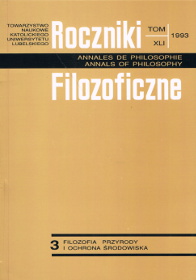Natural Science in Educational System of Polish Church in Age of Enlightenment
Abstract
This article analyses philosophy of the 18th century in the period of transition from taxonomical philosophy of nature to phenomenalistic natural science. This process, illustrated by influential works of Ch. Wolff, J. A. Nollet, E. Purchot (Purchotius), E. Corsini and J. Redlhammer, occured also in Polish educational system run chiefly by the Piarists (A. Wiśniewski, S. Chróścikowski, K. Narbutt) and the Jesuits (J. Jaworski, B. Dobszewicz, S. Szadurski, J. Rogaliński). These works tried most often to coordinate philosophical and scientific methods of analysis. There were made attempts to implement categories of natural science by means of experiment. In spite of minimalism and practicism of these achievements they showed little convergence with the ideals of the 18th century prepositivism. They did not lead (in time) to the eviction of lecturing of philosophy. Cultural creativeness of these changes, which in their turn made the way to modern metodology of science, was bound with debasement of philosophy. Polish authors were noticeable because of their knowledge of metodology and the range of solutions to various problems that could be found in bibliography of that time.
Copyright (c) 1993 Roczniki Filozoficzne

This work is licensed under a Creative Commons Attribution-NonCommercial-NoDerivatives 4.0 International License.





